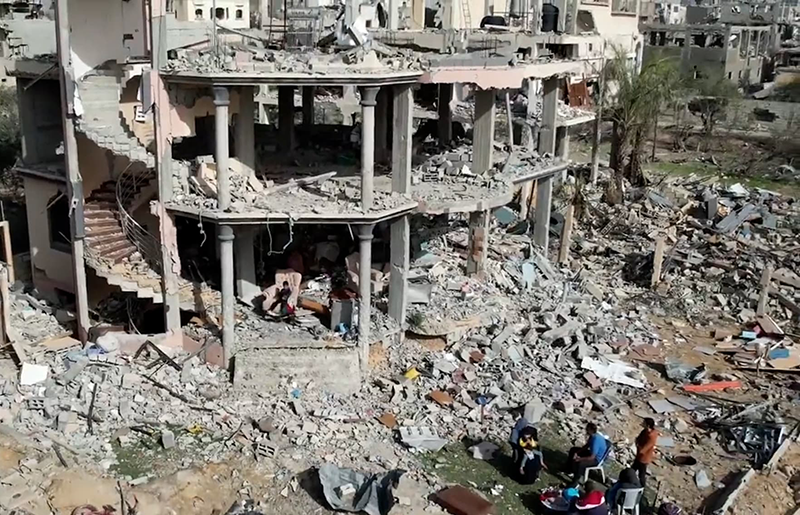- World & Africa
- No Comment
‘Israel must be stopped’ in Gaza, South Africa tells World Court

By Reuters
- South Africa asks court to order halt to Rafah operation
- Genocide ongoing in Gaza, lawyers tell judges
- Court must order “complete withdrawal,” South Africa says
- Israel to respond to allegations on Friday
THE HAGUE: South Africa urged the U.N.’s top court on Thursday to order a halt to Israel’s offensive on Rafah, saying attacks on the southern Gaza city “must be stopped” to ensure the survival of the Palestinian people.
South Africa’s ambassador to the Netherlands, Vusimuzi Madonsela, asked judges to order Israel to “immediately, totally and unconditionally, withdraw the Israeli army from the entirety of the Gaza Strip.”
The two days of hearings at the International Court of Justice, also known as the World Court, are part of a case brought by South Africa accusing Israel of genocide.
Israel, which has denounced South Africa’s claim that it is violating the 1949 Genocide Convention as baseless, will respond in court on Friday.
Last week South Africa asked for additional emergency measures to protect Rafah, where more than a million Palestinians have been sheltering.
South Africa also asked the court to order Israel to allow unimpeded access to Gaza for U.N. officials, organisations providing humanitarian aid, journalists and investigators.
Israel’s military campaign has killed tens of thousands of children and women, destroyed civilian infrastructure and starved the population, South Africa’s legal team told the court.
“From the onset Israel’s intent was always to destroy Palestinian life and to wipe them off the face of the earth. Rafah is the final stand,” Tembeka Ngcukaitobi, one of the legal team, said.
“Israel must be stopped. South Africa is before you again today to respectfully ask the court to invoke its powers … to order a remedy that will stop Israel,” said Adila Hassim, another lawyer for South Africa.
Posting on social media, Israel’s Foreign Ministry said, “South Africa’s claims are both morally and factually distorted” and Israel’s military abides by international law.
“The terrorists of Hamas are using South Africa in their attempt to exploit the International Court of Justice (ICJ),” it said.
The Israel Defense Forces’ operations against Hamas in Gaza “are carried out while implementing measures to minimize harm to civilians and civilian facilities, alongside the continuing transfer of humanitarian aid to the Gaza Strip,” the foreign ministry said. It called on judges to reject South Africa’s requests.
At least 35,272 Palestinians have been killed in Israel’s seven-month-old assault on the Gaza Strip, health officials in the enclave said on Thursday. The war began when Hamas militants attacked Israel on Oct. 7, killing 1,200 people and abducting 253 others. Of those, 133 are believed to remain in captivity in Gaza, according to Israeli tallies.
‘MAN-MADE STARVATION’
Israel says it needs to eliminate Hamas for its own protection and in previous filings to the ICJ it has stressed that it has stepped up efforts to get humanitarian aid into Gaza as the court had ordered.
South Africa attorney Max du Plessis said Israel’s declared humanitarian zones – areas it ordered Gazans into to avoid military operations – were a “cruel distortion” because people were often too starved to flee. Those strong enough to leave to shelters were sometimes attacked by Israeli forces.
“There is nothing humanitarian about these humanitarian zones,” he said. “Israel’s genocide of Palestinians continues through military attacks and man-made starvation.”
Gilad Erdan, Israel’s ambassador to the United Nations, told Army Radio on Wednesday that the short notice the court had given for this week’s hearings did not allow sufficient legal preparation. That was “a telling sign”, he said.
This week’s hearings will only focus on issuing emergency measures and it will likely take years before the court can rule on the underlying charge of genocide.
In January, the court ordered Israel to ensure its troops commit no genocidal acts against Palestinians in Gaza, allow in more humanitarian aid and preserve any evidence of violations.
The ICJ’s rulings and orders are binding and without appeal. While the court has no way to enforce them, an order against a country could hurt its international reputation and set legal precedent.
